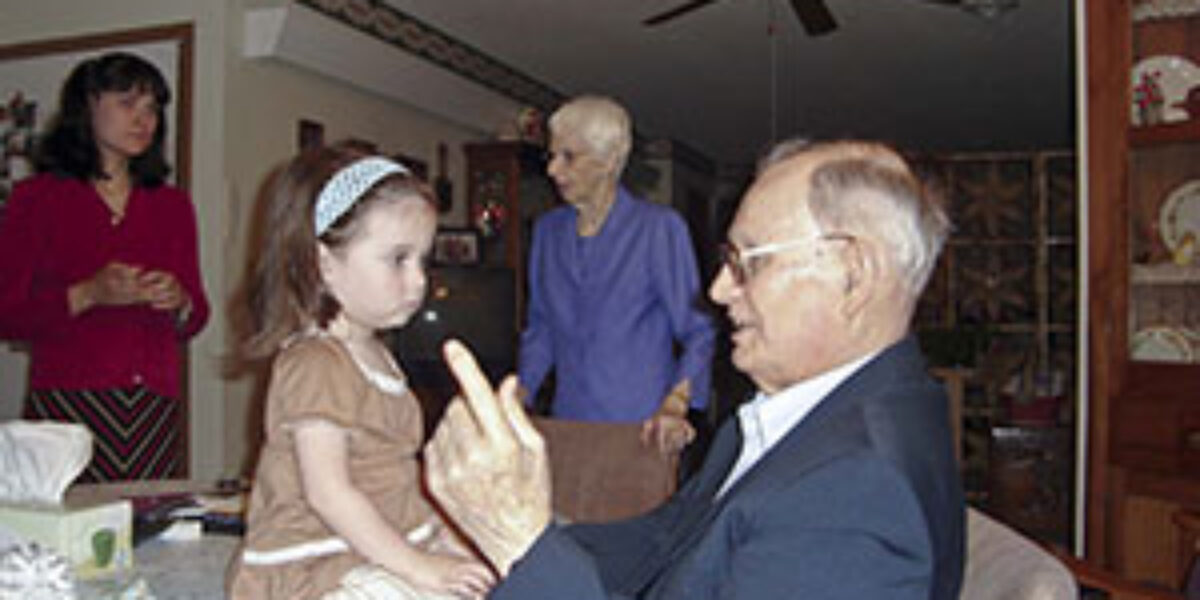WELLMAN, Iowa (Mennonite Mission Network) — Eugene Blosser thought he would spend his life ministering in China. He was off by only a few hundred miles.
Blosser, 91, who died June 8 in Wellman, Iowa, following a long respiratory illness, spent 28 years doing mission work planting churches, serving established congregations and an international school in Hokkaido, Japan, with his first wife, Louella. His service continued in Iowa, where he and his second wife, Elsie, were active at Wellman Mennonite Church for 24 years after their retirement.
Blosser and his first wife, Louella, married in Hong Kong, where each had been sent separately by Mennonite Board of Missions, a predecessor agency of Mennonite Mission Network. Louella, then a Gingerich, was part of the first mission group sent to China in 1947.
In December 1949, three months after their wedding, Communists took over Chengdu, China, where they were serving. By January 1951, the Blossers, with their new son, Philip, were leaving Communist China with the rest of the Mennonite mission workers.
The Blossers intended next to serve the church in India, but the Indian consulate rejected their visa application. Instead, God led them to Japan where they ministered in Tokyo and on Hokkaido, Japan’s northernmost island.
Masakazu Yamade, an executive member of Japan Mennonite Fellowship, chaired Hokkaido Mennonite Conference when the Blossers served in Taiki.
“From a missiological perspective, the Blossers were always willing to go where there was need,” said Yamade*, calling them pilgrims on this earth. He recalled when they left Taiki, despite an expectation for growth there, because no one else was available to continue work at a Sapporo boarding facility for missionary children.
“This was also God’s leading, because the move resulted not only in the start of the first Mennonite church in Sapporo but also led to Mennonite relationships with other denominations,” Yamade said.
In a set of memoirs, some of which are published online at eugeneblosser.blogspot.com, Blosser wrote, “Our hearts’ desire was that we would be servants of Jesus Christ, communicating His Gospel to people who would learn to know Our Savior, and to worship Him with us,”
The Blossers stayed in Japan from 1953 to 1981. Working with other Mennonite mission workers and Japanese Christians, they planted churches in the cities of Taiki, Sapporo and Hiroo, ministering, evangelizing and baptizing. They also worked with already established churches in Obihiro and Kushiro, where they spent time alongside pastor Akira Mimoto at Tottori Mennonite Church, the first Hokkaido Mennonite congregation established deliberately by a team of North Americans and Japanese.
Mimoto remembered the Blossers’ support and caring.
"They were ready and willing to do any ministry asked of them. Once when I borrowed the car that Gene was so proud of, and accidentally scraped it, he didn’t make a big deal about the damage, but instead was more concerned about comforting me over my mistake," Mimoto said.* "I have never forgotten that large-heartedness and warmth."
Blosser served as treasurer for Japan Mennonite Mission and served on various Hokkaido Mennonite Conference committees. They returned after retirement to work for a short time at the Tokyo Anabaptist Center.
At the Sapporo boarding facility for missionary children who attended Hokkaido International School, the Blossers were known as “Uncle Gene” and “Aunt Louella,” according to Charles Shenk, who served in Japan with his wife, Ruth, from 1957-1994.
“Eugene was gentle, kind and patient, but solid as a rock in his faith, his love for the Japanese people and his commitment to the mission of our church in Japan,” Shenk wrote. “He was always held in high esteem for his humility, quiet wisdom and affirming spirit.”
Yamade added, “Eugene always exuded good-natured sincerity, gentleness, and warm-heartedness. In contrast to vivacious and outgoing Louella, Eugene was more reserved. Expanding their circle of friendship among the neighbors around them as they moved from place to place, the aura that the two of them created drew many into faith.”
Eugene Edward Blosser was born March 27, 1917, to Perry and Ada V. Lahman Blosser of South English, Iowa. He was eighth of nine children. During World War II, Blosser served in the Civilian Public Service corps in Nebraska and Wisconsin. After earning his graduation equivalency diploma, he graduated from Goshen (Ind.) College and Goshen Biblical Seminary and did post-graduate work in Far Eastern studies at the University of Michigan.
He married Louella Gingerich Sept. 19, 1949, in Hong Kong. She died in 1983 after being diagnosed with cancer. He married Elsie Zook of Wellman August 7, 1984. She survives with his children, Philip (Amy) of Detroit, Mich., Rachel (Rodney) Blosser Derstine of Schwenksville, Pa., and Meiko (Ewald) Blosser of Seattle, Wash; eight grand-children; and four great-grandchildren.
One son, Thomas Yoshiro; six brothers, Wilmer, Aquila, Dwight, Menno, Oren and Amos; and two sisters, Abbie Zook and Mary Kate Yoder, are deceased.
During his ministerial career, Blosser also served as pastor for a Parnell (Iowa) Mennonite Church, a church plant out of nearby West Union Mennonite Church, and he and Louella pastored First Mennonite Church in Nampa, Idaho.
A funeral service was Monday, June 9, at Wellman Mennonite Church, the Rev. Marvin Hostetler officiating. Burial was in West Union Cemetery in Wellman.
Memorials may be given to Wellman Mennonite Church or Mennonite Mission Network. Condolences may be sent to Powell Funeral Home and Cremation Service in Wellman at www.powellfuneralhomes.com.
* Japanese translations for Akiro Mimoto and Masakazu Yamade were provided by Mary Beyler, mission worker in Obihiro, Japan, through Mennonite Mission Network.







